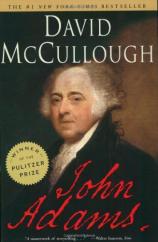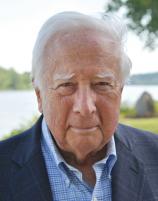John Adams
Review
John Adams
Ask the average person to name those who played significant roles in the events of the American Revolution and the formation of our republic and they'd likely give you the standard answers: Washington, Jefferson, Franklin, Madison. Patrick Henry's impassioned speech and Thomas Paine's inflammatory Common Sense might also be among the voices that still reverberate over the centuries. One man who's not as likely to be foremost in our minds is John Adams. Aside from his notable service as our second President, Adams seems to have drifted into the shadows of his more celebrated peers. With the publication of JOHN ADAMS, David McCullough has reassembled the players, provided the historical stage and compiled a voluminous biography that sheds welcome light on both the politician and the man.
As McCullough points out, Adams may have been a reluctant politician who preferred home and family to the hectic life of public servant. Nevertheless, when he realized the struggling colonies needed men of wisdom and dedication to guide the events that were unfolding, he became one of the most tenacious patriots of the Revolution. And contrary to what lesser historical accounts might have us believe, his voice of reason and his unflagging persistence are more directly responsible for the outcome than those who usually receive the lion's share of the credit. In 1765, with the creation of the Stamp Act, the first glimmer of the astute political mind and eloquent writing of John Adams became public.
"Let us dare to read, think, speak, write...Let it be known that British liberties are not the grants of princes or parliaments...that many of our rights are inherent and essential..."
Evidence of his visionary contributions to the painful birth of our fledgling country can be found in nearly every major step taken and document drawn. As early as February of 1776, Adams was proposing an alliance with France and Spain to strengthen America's position in her fight for freedom. Prophetically, he was one of the few who foresaw a long war to achieve independence and knew the American forces were unlikely to succeed without some substantial support from her European sympathizers. He was also one of the earliest to realize that independence was the only feasible resolution to the differences between the American colonies and it's tyrannical parent. While others of equal stature in the Philadelphia congress were still toying with the idea of negotiating certain demands, Adams remained steadfast that any hope of reconciliation was an illusion.
Likewise, he had a clear, unwavering concept of what form any new government of the colonies should take. He argued tirelessly for a republic designed with a two part legislature, an executive, and a judicial branch; each with it's own powers providing balance for the others. Citing specifics such as lifetime appointments for judges and the executive veto, Adams's Thoughts on Government first appeared in letter form to a friend and were later echoed throughout the drafting of the U. S. Constitution.
In addition to exploring the life and career of John Adams, McCullough has encompassed the full tapestry of people, places, and events surrounding Adams from boyhood on. One of two prominent threads that lend a fascinating dynamic to this portrait was his marriage to Abigail Smith. Abigail was a remarkable woman, a steadying hand and the love of his life. Their union was passionate, spiritual and intellectual, and it was their constant correspondence during Adams's absences that provided a wealth of insight for McCullough to draw from. Abigail was clearly his sounding board and reliable advisor, rarely shy at expressing her opinions on issues like slavery and independence. In one of her early letters, she even expressed what would eventually become a revolutionary idea on it's own --- women's suffrage. "If particular care and attention is not paid to the ladies we are determined to foment a rebellion, and will not hold ourselves bound by any laws in which we have no voice or representation." A playful taunt perhaps, but also reflective of her uncompromising values.
By far the strongest thread, however, becomes the characterization of the lifelong relationship between John Adams and Thomas Jefferson. Despite their common intellectual ground and mutual desire to create a stable new government, the two would eventually become bitter rivals over political ideology. The various factions that formed over the constitutional issues and later incited party divisions constantly rocked the unsteady new republic and would reach their peak during Adams's presidency. As Adams leaned farther and farther toward Federalism, Jefferson distanced himself and eventually became Adams's bitter opponent in the presidential election.
Although he wasn't a particularly commanding presence in politics, McCullough notes that Adams was actually quite successful as President during very troubled times. While McCullough is thorough and fair in his assessment of Adams's weaknesses, he is equally honest, occasionally scathing, in his depiction of Jefferson. In fact, with no disrespect for the monumental tasks with which they were faced, his finely honed perspective of our founding fathers steps away from their larger-than-life images and makes them very human and accessible. Lavish and abundant in documentation, readers will be delighted with the fascinating, colorful narrative in JOHN ADAMS; and David McCullough may very well find himself on the well-deserved short list for a second Pulitzer Prize.
Reviewed by Ann Bruns on September 1, 2002
John Adams
- Publication Date: September 3, 2002
- Genres: Biography, Nonfiction
- Paperback: 752 pages
- Publisher: Simon & Schuster
- ISBN-10: 0743223136
- ISBN-13: 9780743223133










